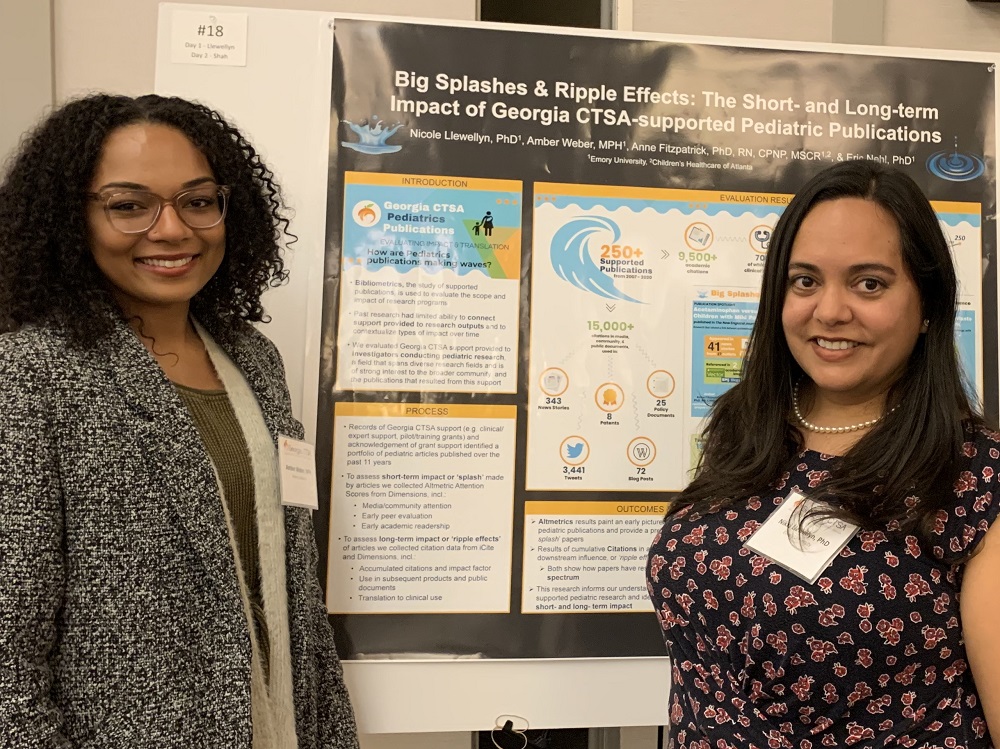Expanding the View of Georgia CTSA Pediatrics Program's Research Impact

The Georgia CTSA Evaluation and Continuous Improvement (ECI) program recently completed a study providing greater insight into the range and depth of short-term influence and long-term impact made by a portfolio of 250 Georgia CTSA-supported pediatric publications. This evaluation of Georgia CTSA's pediatric research output found a body of work that is highly impactful compared to similar work by other institutions. The Georgia CTSA Pediatrics program is a longstanding effort to transform scientific discovery into solutions that improve pediatric health. Designed to provide the necessary infrastructure for investigators conducting pediatric clinical research, the Pediatrics program offers training, provides pilot funding, and ensures research projects have the resources needed to move forward. Our designated pediatric centers improve the ability of pediatric researchers to perform innovative research while providing patients and their families with increased access to leading-edge clinical trials.
Health science evaluators have worked to understand the impact of various research programs through bibliometrics, or the study of supported publication portfolios. Past research has been limited in its ability to directly connect support provided to bibliometric research outputs, and in contextualizing impact over time. To fill this gap in understanding the larger impact of research, the Georgia CTSA ECI program utilized two new, innovative bibliometric tools, Altmetric and Dimensions, to gain a more holistic perspective on how our research has made an impact. Dimensions serves as a comprehensive, research database that links related publication, patent, policy document, and dataset information. Complementary to this information, Altmetric offers additional ways to indicate influence and impact by showcasing attention metrics such as mentions in news outlets, blogs, Twitter, and more. The ECI team partnered with the Georgia CTSA Pediatrics program to meticulously evaluate Georgia CTSA support provided to investigators conducting pediatric research to understand both short-term attention and long-term influence associated with the resulting pediatric publications. This field is unique in its coverage of diverse research areas and is of interest to the broader community.
Nicole Llewellyn, PhD, Manager of Evaluation & Continuous Improvement Research Projects, led this initiative by using records detailing Georgia CTSA services provided and formal acknowledgment of grant support in publications to define a portfolio of 93 investigators, authoring 250 pediatric articles over the past 11 years. Publications were identified as pediatric based upon having a pediatric author and clear pediatric content. Top research areas of these articles include immunology, allergies, and hematology. To assess short-term impact made by an article, Llewellyn collected Altmetric Attention Scores, including information on media and community attention, and peer evaluation and readership. Llewellyn also reviewed data on accrued citations in subsequent academic products and public documents to assess long-term impact of an article.
These 250 Georgia CTSA-supported pediatric research articles have accrued over 9,500 academic citations, which are more than 3 times the expected rate. In addition to these traditional-based citation metrics, these articles have accrued more than 15,000 Altmetric citations in media, community and public documents, including 343 news stories, 72 blog posts, 3,441 tweets, 25 policy documents, and 8 patent applications. Illustrations of research that influence social discourse include a 2019 paper on adolescent fatty liver disease that appeared in over 20 news outlets including TheNew York Times and 600 tweets to over 2 million followers and a 2018 paper on T-cell therapy for leukemia that appeared in 8 science blogs and news outlets around the world (e.g., BBC News, Deutsches Arzteblatt, Medindia). Examples of research with lasting societal impact include a 2011 article on sugar consumption that has been cited in multiple CDC policy reports and a 2012 article on a new treatment for kidney disease that led to patents on its formulation and manufacture.
Short-term influence and long-term impact depicted by Altmetric and Dimensions tell the story of this program's research impact in ways that go beyond traditional citation measures and inform our understanding of how these research products are being used and translated in the broader community. When discussing the importance of this research, Anne Fitzpatrick, PhD, MSc, Director of the Pediatrics program, adds, "This study highlights the tremendous research that Georgia CTSA investigators are doing in the field of Pediatrics. This Georgia CTSA Pediatrics research has not only influenced other researchers but also has directly impacted the care of children across multiple conditions."
At the 2020 Southeastern Pediatric Research Conference, the ECI program presented this research abstract and poster titled, "Expanding the View of Research Impact: Altmetrics of the Georgia CTSA Pediatrics Program." Llewellyn expresses, "This evaluation showcases the broad impact of pediatric research made possible by the Georgia CTSA, not just in academia, but in public health, technology, and the community."
The Georgia CTSA is a statewide partnership between Emory, MSM, Georgia Tech, and UGA and is one of over 50 in a national consortium striving to improve the way biomedical research is conducted across the country. The consortium, funded through the National Center for Advancing Translational Sciences (NCATS) and the National Institutes of Health's Clinical and Translational Science Awards, shares a common vision to translate laboratory discoveries into treatments for patients, engage communities in clinical research efforts, and train the next generation of clinical investigators. For more information, click here.